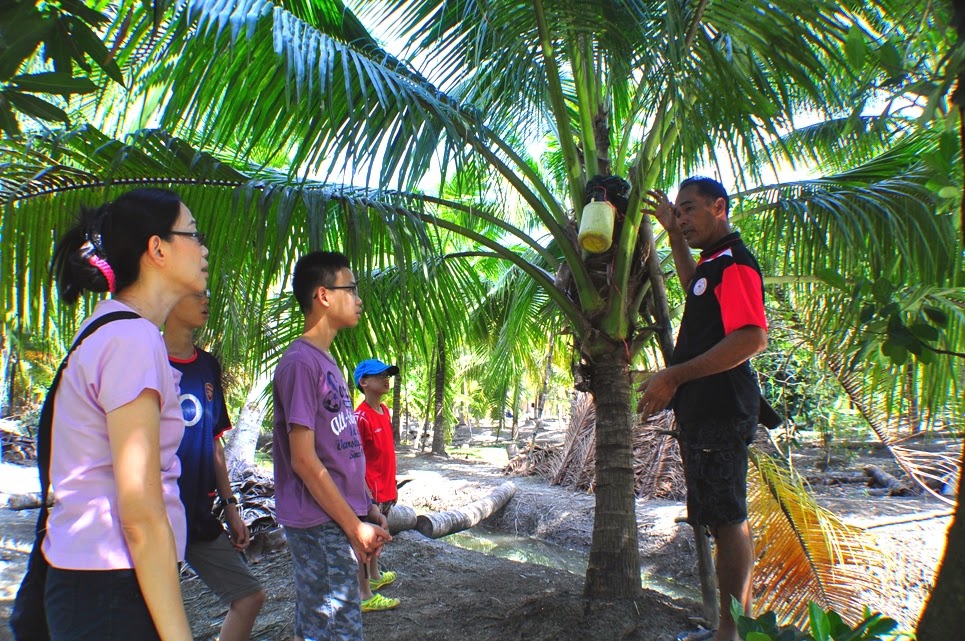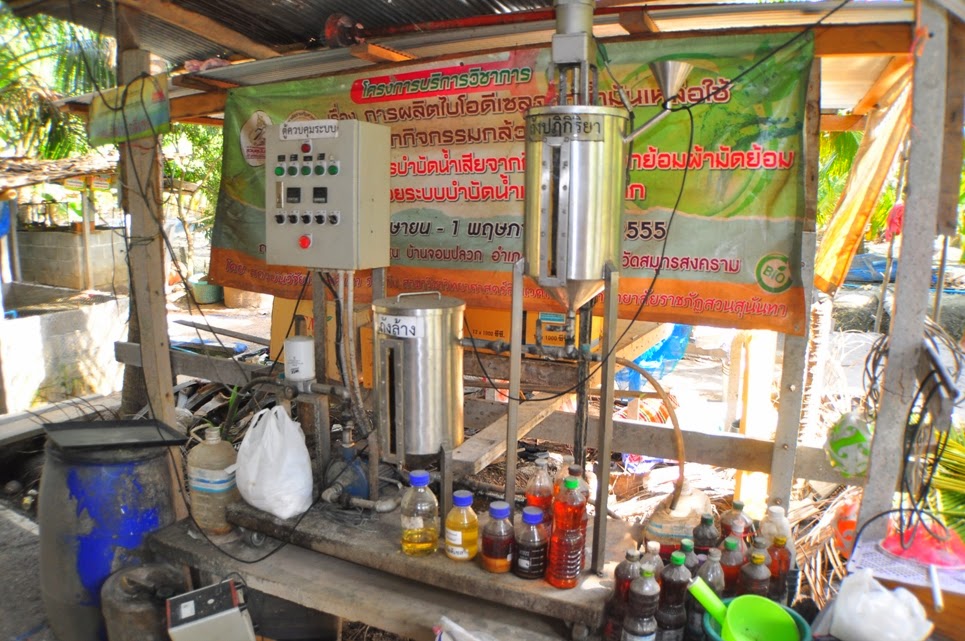Bangkontee Off-the-Path - 20 Dec 2014
My previous post - Coconut Grove @ Bangkontee led us to a beautiful and serene place with tall, elegant coconut palm trees in between many small canals. The green water ferns on the canals were captivating. We're so taken in by the view and wandered on and on into a farm. We met Mr Suchon, the owner of the farm, and meant to ask him for permission to take some pictures. Little did we know that this was just the start of our adventure. We're so privileged that he gave us a personal tour of the place without any hesitation. I have to admit that initially I thought he had wanted to sell us his goods. Not only he did not, but he was so friendly and hospitable.
A demonstration of how the raw palm sugar was derived from the young coconut palm.
The flower will be cut twice a day, and liquid sap will drip into a container. Sugar palm can only be harvested in trees of about 4 years old, and for the next 20 years they can continue to produce the raw sugar. If raw sugar is not harvested, then the flower will grow into coconut fruits, and useful for other purposes.
End product - 'palm sugar'.
THE HOMESTAY
This farm offers homestay with farming activities. There's no website or any publicity but Mr Suchon is quite a well-known figure in this area. Cooking class can be arranged for homestay guests. We couldn't help but notice the place is very clean and environmentally friendly. There're hardly many workers around.
Guests can also learn to make a local delicacy - preserved eggs using herbs and spices - all produce is sourced mostly from their own farm.
A SUSTAINABLE FARM
We saw chickens in baskets tied to rows of trees.
Small-scale poultry farming eg chickens, ducks, quails, etc for meat and eggs. Frogs are also included in the menu!
Poultry manure converted into methane gas for cooking.
Biogas is environmentally friendly and you can see the bottom of the pan is clean.
Fish and shrimp rearing in the small canals and a homemade aeration system for the fish and shrimps.
Raising tiny wild bees for honey. These Chanorg bees are quite harmless and they're everywhere in the farm. The tiny wild bees produce honey using nectar from flowers.
Waste products from the coconut grove and farm are turned into useful products, eg. biodiesel to generate electricity and used in incinerator to make charcoals.
Using solar energy to dry legume, charcoal, fish and other produce from the farm.
Cultivating oyster mushroom and other fungus from sawdust and other waste products.
Truly, this tour was eye-opening and beyond what we had expected here. The boys, too, I hope would catch on something from Mr Suchon - he was very inspiring and humble to share his knowledge and passion with us. I finally understood why this whole place looked so clean and neat - cos everything, even the waste, is recycled. Just like the coconut tree, every part is useful and has its place here.
A MAGICAL GARDEN
A beautiful garden in between small canals, next to the homestay chalets. It's so magical, like a garden from a fairytale. I can just relax here the whole day.
Guests can go for boat ride to catch fish or see the fireflies or simply to relax....
Lookout for many wild orchids and flowers around the farm and garden.
We didn't have to spend so much money to travel far for a wonderful experience. Mr Suchon makes something inspiring from ordinary things - just like the rose bouquet from pandan leaves. He has won many awards for his innovations and creativity, even from the King of Thailand. He's not highly educated, more of a self-made man.
Mr Suchon's farm is a learning centre. And this is not the only one in Thailand. It's part of a grassroot movement in Thailand helping and supporting people to be self-sufficient and passing on the cultural heritage from one generation to the next. You can find it also in making handicraft, dessert, soap and spa products, salt and in many other cottage industries.









.JPG)













Comments
Post a Comment